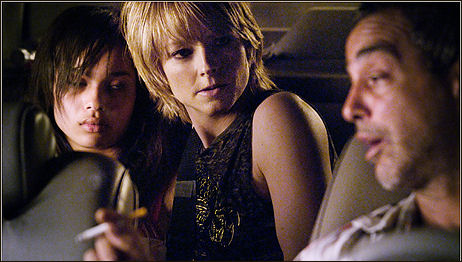There’s an 8.26 David Halbfinger N.Y. Times piece that searches for meaning in two noteworthy rage-and-revenge movies — Neil Jordan‘s The Brave One (Warner Bros., 9.14) and James Wan‘s Death Sentence (Fox Atomic, 8.31) with Jodie Foster and Kevin Bacon, respectively — as well as the less prominent Descent, which starred Rosario Dawson, and a British revenge movie called Outlaw, which starred Sean Bean.

The piece asks whether audiences today might be ready for a new wave of cathartic, rough justice at the movies. Halbfinger quotes original “Death Wish” author Brian Garfield as saying that “people are just sort of simmering with the kind of anger that they can’t really define, and this kind of movie gives them some kind of release.” But this anger seems incompletely defined by Halbfinger also.
Street crime, after all, is not the nationwide virus or pestilence it once seemed to be. New York City is thought to be a much safer place it was in the early ’70s, when Garfield wrote the book, or when the Michael Winner-Charles Bronson film of Death Wish came out in ’74.
I think these films are about getting revenge upon a general “themn” — an unruly, assaultive, disenfranchised element that would puncture our indoor-shopping-mall complacency and invade our air-conditioned membranes inside our SUVs. This includes not just criminals but the whole Middle Eastern crew..anyone lobbing grenades in our direction. In this sense the best post-9.11 revenge movie of them all has been Tony Scott‘s Man on Fire — a movie that Bush and Cheney probably loved, and which I genuinely respected as one of the best right-wing propaganda films ever made.










